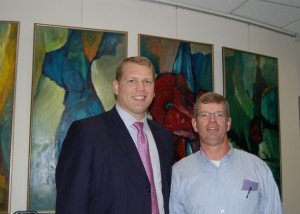
Inspired by the death of "Austin" Trenum, Virginia Del. Rich Anderson of the 51st District put forth a bill in the General Assembly, requiring all school and non-school youth based sports that make use of local or school fields to require concussion training for their athletes.
According to the bill, “each local school division and each local youth sports organization shall annually review such information and sign and return a consent form stating that they have received and reviewed such information and are aware of the risks associated with concussion, and consent to their child’s participation.”
Del. Rich Anderson said Colorado was the first state to enact such a law, but Virginia would still be among one of the first states in the country to require youth athletes receive information on the dangers of concussions.
Anderson’s bill was influenced by the passing of a Nokesville teen in 2011. “Austin” Gilbert Trenum III took his life a few days after suffering a concussion, while playing football for the Brentsville Tigers. Austin was a high school senior, and was a happy, well-adjusted student before experiencing a concussion.
Since then, Austin’s parents, Gil Trenum Jr., and Michelle Trenum, have made it their mission to educated schools, parents, coaches, athletes and politicians about the dangers of concussions.
Being the school board representative for the Brentsville District, Gil Trenum first worked to pass the requirement that every Prince William County School athlete must attend concussion training once a year along with one parent or guardian. Next, he advocated for the Virginia state law requiring all Virginia school athletes and their parents are made aware of the risks and dangers of concussions.
Presently, Trenum hopes to extend the law to include children participating in organized youth sports outside of the school.
“We feel that this is important to all athletes because the current legislation only applies to school-based activities. Concussions don’t discriminate between school-based activities and non-school ones. There are many children and teenagers, who are playing in recreational leagues outside of school or who are not yet old enough to participate on school teams, and they deserve same level of concern for their safety and welfare,” Mr. Trenum said.
While concussions have recently gained national media attention in regards to professional athletes, many parents are not aware of the risk of brain damage in children, who sustain blows to the heads. Concussions are most common in contact sports like football, but may also occur when athletes hit their heads on hard ground, floors or walls, or collide with other players.
In fact, the younger the child, the more lasting the effects from a concussion can be.
“What we have learned over the last couple of years,” said Trenum, “is that not only are concussions more frequent, than what was previously thought; they happen to kids younger than what is usually expected, and the effects can last longer, sometimes much longer.”
Trenum said this is because children have brains that are still developing.
“Children’s brains are damaged easier than adult brains, because they have less myelin. Myelin is the fat the covers the fiber tracts in the brain and helps protect them from injury. Research suggests that if you start accumulating concussions earlier in life you wind up with more of them over a lifetime and more resulting associated trauma.”
Trenum believes that concussion training and the dissemination of information in regards to concussions will increase how seriously coaches, athletes and parents respond to concussions. This makes a difference in a child's health, because according to Trenum, the sooner a child gets to a doctor after a concussion, the better the chances for prolonged recovery.
The training also helps the athlete and those around him better identify the signs and symptoms of a concussion, such as fuzzy thinking, dizziness, headaches and blurred vision; increased irritability, anxiety or nervousness; and insomnia or prolonged sleep.
In a letter posted on Prince William Schools Reform website, Michelle Trenum asked that community members voice their support for the bill, while pointing out that the bill is in no way an attack on youth sports.
“Our youth league experiences have been an important part of our boys’ lives. We realize the importance of those leagues in raising happy, healthy and active kids, which is why we feel strongly about protecting all those young athletes,” Mrs. Trenum said.
The Trenums are hoping that the Brentsville and Prince William communities will take the lead on urging their their state representatives to pass HB 1719 in support of extending concussion training in youth sports.
Those who wish to support the bill, should email DelDBell@house.virginia.gov;DelSLandes@house.virginia.gov;DelCStolle@house.virginia.gov;delrrobinson@house.virginia.g
They should include “HB 1719 Support” in the subject line of your email, include their name, city, and any experience they have with sport leagues, and the reason they support HB 1719.
Support Bristow Beat - Donate Today!